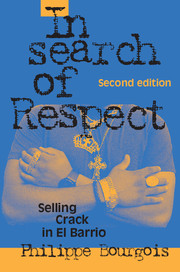Book contents
- Frontmatter
- Contents
- Acknowledgments
- Preface to the 2003 Second Edition
- Introduction
- 1 Violating Apartheid in the United States
- 2 A Street History of El Barrio
- 3 Crackhouse Management: Addiction, Discipline, and Dignity
- 4 “Goin Legit”: Disrespect and Resistance at Work
- 5 School Days: Learning to be a Better Criminal
- 6 Redrawing the Gender Line on the Street
- 7 Families and Children in Pain
- 8 Vulnerable Fathers
- 9 Conclusion
- Epilogue
- Epilogue 2003
- Notes
- Bibliography
- Index
- Other books in the series
5 - School Days: Learning to be a Better Criminal
Published online by Cambridge University Press: 05 June 2014
- Frontmatter
- Contents
- Acknowledgments
- Preface to the 2003 Second Edition
- Introduction
- 1 Violating Apartheid in the United States
- 2 A Street History of El Barrio
- 3 Crackhouse Management: Addiction, Discipline, and Dignity
- 4 “Goin Legit”: Disrespect and Resistance at Work
- 5 School Days: Learning to be a Better Criminal
- 6 Redrawing the Gender Line on the Street
- 7 Families and Children in Pain
- 8 Vulnerable Fathers
- 9 Conclusion
- Epilogue
- Epilogue 2003
- Notes
- Bibliography
- Index
- Other books in the series
Summary
I was chillin' out most of the time in junior high. But they had like a wild war out there – blacks against Puerto Ricans – and the Puerto Rican kids used to get beat up real crazy.
This guy killed this one kid, so we used to not want to go to school because of that. We used to cut school and go downtown and rob.
CaesarThe complex interfaces among family, school, and peer group are crucial to the construction and enforcement of social marginalization, especially in one's pre-teenage years. Consequently, I purposely collected the childhood, school-age reminiscences of the crack dealers in Ray's network in an effort to explore their early institutional relationships with both mainstream society and inner-city street culture. This also led them to talk about their intimate home lives. Much of this material is presented in this and the following three chapters, where I address changing gender-power relations and the transformations in family arrangements with respect to emotional nurturing and economic stability. In this chapter I focus on the quintessential early-socializing institution of mainstream society in the inner city: the public school. This leads fluidly into street culture's alternative to school – the peer group or the proto-criminal youth crew – gang – which effectively fills the formal institutional vacuum created by truancy. When the crack dealers began confiding to me about their earliest teenage experiences of violence and crime on the street, I was also forced to confront the brutal phenomenon of sexual violence that was central to both their formal and their informal schooling.
- Type
- Chapter
- Information
- In Search of RespectSelling Crack in El Barrio, pp. 174 - 212Publisher: Cambridge University PressPrint publication year: 2002

